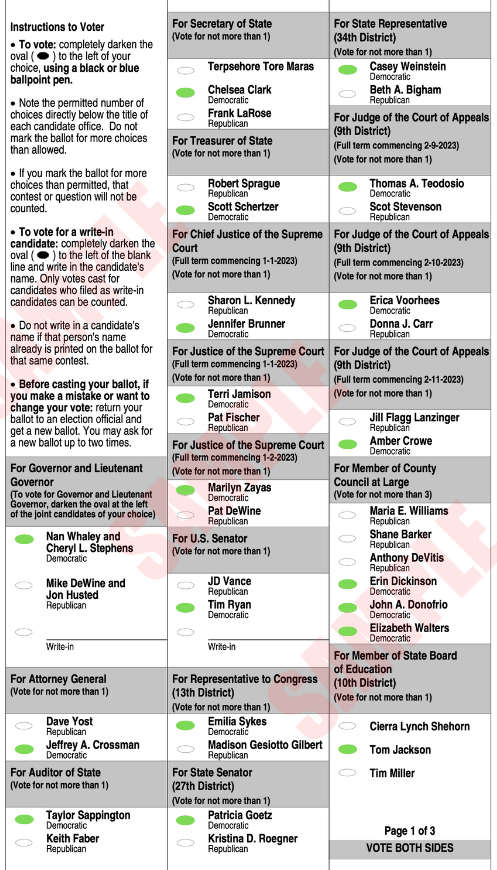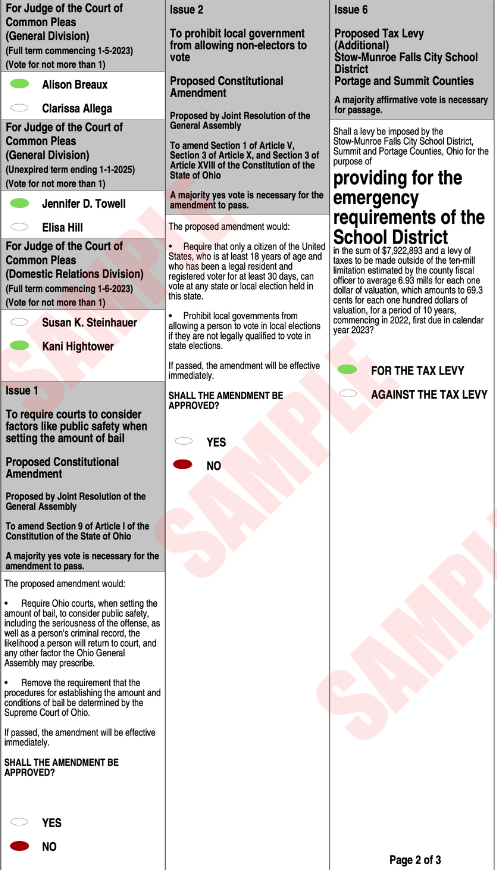Contributors: Deb Wang, Rachel Jamison, and Aaron Yeager.
In the aftermath of the January 6, 2021 insurrection, the overturning of Roe v. Wade, and the murder of Jayland Walker, the General Election in November is extremely important. Below, you’ll find our recommendations on who and what to vote for, including a sample ballot for Stow.
Table of Contents
1. Important dates for voting
2. Sample ballot for Stow, Ohio
3. Details about candidates and issues
Important dates for voting
ELECTION DAY IS TUESDAY NOVEMBER 8, 2022.
Polls open at 6:30 a.m., and close at 7:30 p.m. You can find your polling location by looking up your name on the Board of Elections website.
Other important dates are below:
| Date | Description |
| 9/23 | Military and overseas absentee voting begins. |
| 10/11, at 9 p.m. | Deadline to register to vote. |
| 10/12 to 11/7 | Early in-person voting takes place. This includes select weekend days: 1. Saturday, 10/29 2. Saturday, 11/5 3. Sunday, 11/6 |
| 10/12 | Absentee voting by mail begins. |
| 11/5, at noon | Deadline to request an absentee ballot. |
| 11/7 | Deadline to mail an absentee ballot.* |
*You can also bring your filled-out absentee ballot to the Summit County Board of Elections, by 7:30 p.m., on 11/8.
Sample ballot for Stow, Ohio
Below is a sample ballot for Stow, Ohio, with our voting recommendations. If you live somewhere else in Summit County, you can find your sample ballot by looking up your name on the Board of Elections website.
Page 1

Page 2

Page 3

Details about candidates and issues
Below are the justifications for each of our recommendations. Please note — some of them were taken from a blog post we wrote earlier this year, about the May 2022 Democratic Primary.
Table of Contents
Local candidates
Judge of the Court of Appeals (9th District) (Full Term Commencing February 9, 2023)
Thomas A. Teodosio (Democrat)
Judge Teodosio presided over The Turning Point Program, a court-supervised program for substance dependent offenders, that holds them accountable, and gives them the support and resources they need to become positive, contributing citizens. This is a good step for a judicial system that is often outrageously punitive for drug crimes.
Judge of the Court of Appeals (9th District) (Full Term Commencing February 10, 2023)
Erica Voorhees (Democrat)
Magistrate Voorhees asserts that she is invested in effectively communicating jury instructions; advocates for greater court of appeals transparency to the public; acknowledges that residents should not be punished for struggling to understand and navigate the Court of Appeals, when it can be mysterious even to lawyers; acknowledges that survivors of human trafficking who technically broke the law are victims who need support; and attests to the personal impact of providing meals to survivors of human trafficking.
Judge of the Court of Appeals (9th District) (Full Term Commencing February 11, 2023)
Amber Crowe (Democrat)
Magistrate Crowe helped design the Truancy Mediation Program, which offers alternatives to punitive measures for students who miss school. She also engages deeply with children’s social services, as a Guardian ad Litem for Summit County, and operates from a courts-belong-to-the-people perspective.
Members of County Council at Large
Erin Dickinson (Democrat)
Ms. Dickinson is a member of the Executive Board of Community Legal Aid, and is committed to affordable housing and housing stability initiatives, such as rent and utility assistance. She’s also committed to addressing the digital divide that was made evident by the pandemic, by working to provide broadband internet access for communities to ensure that every student, educational institution, and small business in Summit County has equal access to high-speed, affordable internet.
Dickinson believes it is critical to continue to invest opioid settlement funds into meaningful, evidence-based healthcare initiatives, to address maternal and child health, by working with community partners on an integrated approach.
John A. Donofrio (Democrat)
Mr. Donofrio has helped create several programs to serve Summit County homeowners, including the Real Estate Discount Program, Delinquent Tax Payment Plan, and Military Reserve Payment Plan, and he has 31 years of combined experience as Summit County’s Treasurer and Fiscal Officer.
Elizabeth Walters (Democrat)
Ms. Walters is currently serving her second term, and has been active on a wide variety of issues, including: implementation of Paid Parental Leave for county employees and distributing funding for small business and important social service nonprofits during the pandemic. Currently, Walters chairs the Summit County Environmental Sustainability Task Force, co-chairs the Summit County’s Special Committee to address racism as a public health crisis, and is a Liaison for Summit County Executive Ilene Shapiro’s Council on Diversity and Inclusion.
Walters supported a resolution opposed to 2018 changes in Title X federal fund allocation, and will continue to fight for access to comprehensive family planning, and related preventative health services, regardless of income or resources. Walters steered federal dollars towards public schools to promote health and safety throughout the pandemic, and allocated millions of dollars for opiate abatement.
Member of State Board of Education (10th District)
Tom Jackson (Democrat)
Mr. Jackson wants to shield teachers from right-wing attacks, and fund public schools permanently, ending their two-year funding cycle. He also opposed the Ohio State Legislature’s repeal of its 2020 anti-racism resolution.
Judge of the Court of Common Pleas (General Division) (Full Term Commencing January 5, 2023)
Alison Breaux (Democrat)
Judge Breaux established the first felony mental health court in Summit County, called the Healing, Opportunities, Progress, and Empowerment (HOPE) Court, in 2018, demonstrating a less punitive judicial philosophy.
Judge of the Court of Common Pleas (General Division) (Full Term Commencing January 1, 2025)
Jennifer Towell (Democrat)
Magistrate Towell acknowledges the injustices and barriers imposed by race, class, and especially disability, on people who appear in court. She serves as a “Connect” Developmental Disability Court Advisory Board member.
Judge of the Court of Common Pleas (Domestic Relations Division)
Kani Hightower (Democrat)
Based on what we have read of the candidates’ biographies and interviews, we believe that Magistrate Hightower is more familiar with the most vulnerable in our community and better positioned to deliver fair, wise judgements in their cases.
Local issues
Issue 6: Proposed Tax Levy (Additional), Stow-Munroe Falls City School District, Portage and Summit Counties
We recommend voting “FOR THE TAX LEVY.”
The levy is crucial to maintain current daily operations, including teachers and staff, programs, and utilities. It will also prevent a paywall around enrichment and after-school programs and protect hard-working, economically stressed families from busing service denials.
As we continue to push for increased mental health staff and services, along with a number of other important goals to make sure each student passing through SMF schools is supported, welcomed, and thriving, the passing of this levy could not be more important. Stow-Munroe Falls Schools have been operating on the same budget since 2011, and with inflation, it simply isn’t enough.
If the levy fails, the need does not go away. In fact, the longer the district waits, the more money this issue will cost taxpayers, and the district will have to make reductions districtwide to balance the budget.
Stow Munroe-Falls currently has a lower tax rate than many other districts in Summit County, and even with the slight tax increase from the levy ($20 per month per $100,000 of home value), Stow Munroe-Falls will STILL be one of the least taxed districts in Summit county.
Click here for more information on the upcoming levy.
Issue 25: Proposed Charter Amendment (By Petition), City of Stow
We recommend voting “Yes.”
Issue 25 is a citizen-led initiative created to clarify term limits for Mayor, Finance Director, and Law Director. The current city charter states these positions shall serve no more than two consecutive four-year terms, or eight consecutive years in the same elected office.
For years, there have been efforts to amend the city charter to account for partial terms, because if someone steps up to fill a partial term, they are prevented from serving two full terms, based on the eight-consecutive-year language.
Previous efforts to clarify the term limit language as laid out in the current City Charter have failed, because City Council has blocked them.
This issue is currently relevant, as Mayor Pribonic, who has done a great job managing the city, ran unopposed for his initial, one-year, partial term, which was created when Mayor Kline resigned early. After Mayor Pribonic’s one-year partial term was up, he ran for reelection, and won. Therefore, he’s currently serving his first full, four-year term.
With the existing language in the City Charter, Mayor Pribonic is not eligible to run again for reelection, because another full, four-year term would bring his total tenure to nine consecutive years, when the city charter currently only allows for eight. Thus, if we want to keep him in office, we need to pass this Issue.
Issue 26: Proposed Charter Amendment, City of Stow
We recommend voting “No.”
Issue 26 is a reactionary measure that City Council added to the ballot, in response to the citizen-led Issue 25. City Council has consistently blocked previous initiatives to clarify current term limit language — specifically, for the mayor — for partisan reasons.
Issue 26 is unnecessary, with Issue 25 already on the ballot, and is directly challenging the city’s citizens on their own proposal. City Council’s previous refusal to clarify term limit language, as well as the intentional timing of adding Issue 26 only after Issue 25 made it on the ballot, demonstrates suspicious intentions on the part of Council.
Issue 27: Proposed Charter Amendment, City of Stow
We recommend voting “No.”
We believe that this is a partisan amendment that was added to the ballot by City Council, in an effort to prevent the current administration from accomplishing important tasks without Council approval.
Mayor Pribonic has supported funding programs that strengthen the community the way local government should, such as the Diversity, Equity, and Inclusion (DEI) Initiative, and we are not confident that the majority of City Council shares his philosophy.
Given our policy positions, we do not support any changes to the budget process at this time.
State candidates
Governor and Lieutenant Governor
Nan Whaley and Cheryl L. Stephens (Democrats)
No contest – Ms. Whaley and Ms. Stephens have comprehensive, specific policy plans. We appreciate that Whaley has a plan for Appalachia, meaning she’s not afraid to get specific about the state’s political failures. Whaley prioritizes the working and middle class, by supporting a $15 minimum wage, and addressing issues like wage theft.
Whaley has a proven, pro-choice track record, and Stephens is CEO of the East Akron Neighborhood Development Corporation (EANDC), which focuses on providing affordable housing, also.
Ohio Attorney General
Jeffrey A. Crossman (Democrat)
According to the Columbus Dispatch, Mr. Crossman “demanded an audit on how Akron-based FirstEnergy influenced utility regulators, and called on members of Governor Mike DeWine’s administration to resign over their ties to the company.”
The article goes on to say that he was also “one of a handful of lawmakers pushing for Ohio House Speaker Larry Householder to be ousted from the Ohio House of Representatives,” after Householder and four others were arrested in July 2020, in connection with a $1 billion nuclear plant bailout.
Auditor of State
Taylor Sappington (Democrat)
As the Columbus Dispatch notes, Mr. Sappington is the first openly LGBTQIA2S+ candidate to run in an Ohio statewide election, and “on his first day on the job as the City Auditor of Nelsonville, Ohio, he opened an investigation into Deputy Auditor Stephanie Wilson after recognizing disparities in payroll and direct deposit forms.
Wilson was convicted of felony charges for her scheme to steal hundreds of thousands of dollars from the city and sentenced in December 2020 to nearly five years in prison, according to The Athens News.”
Ohio Secretary of State
Chelsea Clark (Democrat)
According to the Cincinnati Enquirer, “[Ms.] Clark wants to extend early voting to 35 days, set up automatic voter registration, and eliminate voter purges. ‘It’s a constitutional right. Not use it or lose it,’ she said.”
The Enquirer goes on to say that “she is vice-chair of the Forest Park Economic Development Commission, and launched the city’s first minority business initiative.”
Treasurer of State
Scott Schertzer (Democrat)
In an interview with National Public Radio (NPR) station WKSU, Mr. Schertzer said, “You’re going to have a sure thing because I am going to watch every dollar spent, and I’m going to pinch every penny. And I’m also going to be on the lookout for corruption.”
The article also notes that Schertzer “emphasizes the importance of being a watchdog against corruption, noting the federal bribery investigation that led to the arrest of former House Speaker Larry Householder, a Republican who has pleaded not guilty.”
Chief Justice of the Ohio Supreme Court
Jennifer Brunner (Democrat)
Justice Brenner consistently asserts that “the courts belong to the people”; took the time to interview many fellow judicial candidates in her “Achieving Justice” video series, which demonstrated an actual commitment to transparency in judicial elections; wants to continue supporting pandemic recovery efforts; supports expanding and harmonizing the use of technology in local and specialized-docket courts; does not wish to continue penalizing residents with time or transportation challenges; and wants to establish a criminal sentencing database, to analyze sentencing patterns that emerge from systemic racism.
Justice of the Ohio Supreme Court (Full Term Commencing January 1, 2023)
Terri Jamison (Democrat)
According to Cleveland.com, “[Judge] Jamison criticized Justice Patrick Fischer’s controversial comments at the Delaware City Republican Club, [which compared] the U.S. Supreme Court’s [original] decision in Roe v. Wade to decisions that upheld slavery and segregation.”
In an editorial endorsing Judge Jamison, Cleveland.com quotes her as saying that “[it’s] imperative that justices leave their political beliefs at the door and support the rule of law, including ‘substantive due process’ and voter-enacted constitutional reforms, such as those for redistricting.”
Justice of the Ohio Supreme Court (Full Term Commencing January 2, 2023)
Marilyn Zayas (Democrat)
The first Latina elected to the Ohio Court of Appeals, Judge Zayas “created the Educating Tomorrow’s Leaders program, in which high school, college, and law students are invited to the Court of Appeals to interact with judges and attorneys, learn about the law, and allow themselves to dream about where their aspirations might take them,” According to UC News.
Also, according an interview by the Ohio Bar Association in 2016, Zayas said that she will “support and advance the justice reform initiatives introduced by our current Chief Justice, including a sentencing database, and bail reform. [She’s] also interested in advancing initiatives that work towards eliminating bias in our justice system. Additionally, [she] will seek ways to support and enlarge the use of specialized dockets, such as the mental health, human trafficking second chance, veterans, drug court, and commercial dockets.”
State Senator (27th District)
Patricia Goetz (Democrat)
Dr. Goetz is firmly pro-choice; has proposed measures to counter police brutality; supports decriminalizing marijuana; opposes universal school vouchers; opposes funding public schools based on property taxes; supports free or low tuition at community college; opposes guns in schools; opposes exploitative at-will labor practices; and supports a renewable energy economy.
State Representative (34th District)
Casey Weinstein (Democrat)
Rep. Weinstein has a proven track record supporting the following: renewable energy, as co-author of the Energy Jobs & Justice Act; funding local communities, by pressuring the state government to stop hoarding resources; Madeline’s Law, which ensures that families have the insurance coverage necessary to afford hearing aids for their children; environmental protection of Ohio water resources; and safe, legal access to abortion.
He has also asserted that he opposes state funding of charter schools.
State issues
Issue 1: To require courts to consider factors like public safety when setting the amount of bail
We recommend voting “No.”
According to the Columbus Dispatch:
“The Bail Project […] opposes the issue, saying: ‘Judges in Ohio already have the authority to deny bail when public safety is a concern. What the amendment does is double down on the use of money as a proxy for who is detained or released before trial — a practice that discriminates against the poor and disproportionately people of color.’”
We agree with The Bail Project that Issue 1 only reinforces the false legitimacy of criminalizing poverty. We urge citizens to place an initiative abolishing cash bail on the next ballot, instead.
Issue 2: To prohibit local government from allowing non-electors to vote
We recommend voting “No.”
According to the Columbus Dispatch, “Democratic lawmakers are […] urging a ‘no’ vote on the amendment, calling it ‘unnecessary’ and ‘cloaked in fear and false patriotism,’ wrote state [Representatives] Bishara Addison, Juanita O. Brent, Tavia Galonski and Michael Skindell.
They claim the amendment could restrict a 17-year-old Ohioan’s right to vote in a primary if they turn 18 by the general election.”
In this climate of deliberate voter suppression, we do not endorse redundant legislation that offers political ammunition to weakening our democracy.
Federal candidates
U.S. Senator
Tim Ryan (Democrat)
According to an endorsement editorial on Cleveland.com, “[Mr.] Ryan wants to concentrate on economic reform, health care, taking care of the Great Lakes, and education, among other issues, but the one thing that has marked his career from the start has been his commitment to workers, organized labor, and the middle class.
‘I am running for the U.S. Senate to cut Ohio workers in on the deal,’ he said. ‘Ohioans are working longer and harder than ever before, and still falling further behind, while too many in Washington are disconnected from the challenges at hand and instead want to wage culture wars and sow discord and division.'”
Representative to Congress (34th District)
Emilia Sykes (Democrat)
Ms. Sykes will push to cap the cost of life-saving medications, such as insulin; make sure there are affordable long-term care options for Ohioans; and continue eliminating systemic biases that lead to health inequities.
She also led a bipartisan effort to ensure that survivors of domestic abuse could be protected, and worked to make it a crime for people to track others without their consent.
In the realm of women’s rights, Sykes oversaw the passage of legislation eliminating the sales tax on feminine hygiene products, and helped create the state’s Black Maternal Health Caucus to ensure healthier moms and babies. She has also said that she’ll fight against any attempts to criminalize abortion and contraception.
Finally, she supports ensuring there is accountability and trust between law enforcement the community through meaningful criminal justice reform efforts.

